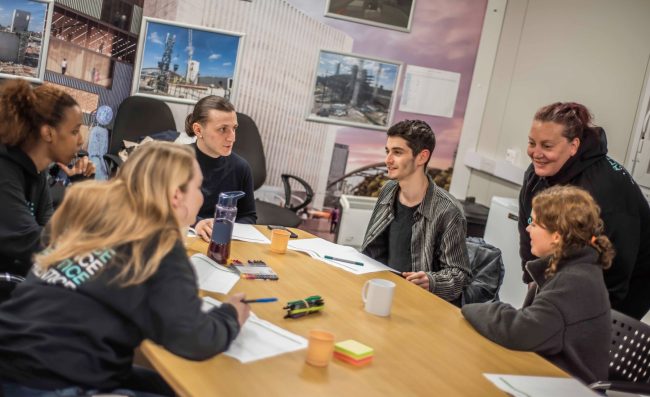Meet the Factory Academy Training Providers

Meet The Factory Academy Training Providers
As we continue on our journey towards The Factory, we are already creating opportunities for local people through our pioneering Factory Academy training and apprenticeship programme.
In May, we were delighted to confirm Access Creative College, a national creative college with a major school in Manchester, and National College Creative Industries, which provides specialist higher-level training for students and employers across the creative and cultural industries, as our training provider partners. Since then we’ve been working on our first collaborative programmes including painstakingly developing a bespoke curriculum for the new Creative Venue Technician apprenticeships and building our vision for The Factory Academy’s future together.
In the last in our series marking National Apprenticeship Week we caught up with Gary from Access Creative College to find out about their experience of the scheme.
Gary Briggs, Operations Manager for ACC’s Adult Skills Provision in Manchester
What is your involvement in The Factory Academy? What appealed to you about being involved in the project?
Access Creative College’s role as a Factory Academy partner was to develop and manage a programme of supported study and experience, to prepare young people for an apprenticeship in the creative and cultural sector. The project appealed as there is clearly a shared desire to do something different that was genuinely inclusive and all about the experience and the impact it will have on the Greater Manchester community.
How has the process been different from other approaches to apprenticeships? What do you think are the benefits of working collectively in this way?
The process really has been all about collaboration, Manchester International Festival (MIF), National College Creative Industries (NCCI), Access Creative College (ACC) and the Greater Manchester Consortium Employers [a network of arts organisations initiated by MIF] all had a voice and were able to influence every decision linked to design and implementation of the project, which meant all the elements of the resulting programme were aligned and had a purpose.
Can you tell us about the pre-employment traineeship? What role did it play in the apprenticeship process?
The traineeship had a strong focus on personal development, self-reflection and project-based learning, achieved through a mix of classroom and field-based learning and, crucially, a three-week placement with a consortium member. The traineeship was developed with the intention of preparing the participants to recognise and seize an opportunity and we were delighted that four of the traineeship graduates were eventually recruited against the five available Creative Venue Technician (CVT) apprenticeships.
Why are apprenticeships important for employees and employers?
Apprenticeships are important as they offer the chance of a career to people, initially on the basis of having a good attitude and commitment, with the understanding that the sector skills and experience will come in time. If approached in the right way, an apprenticeship is a platform for an employer to truly nurture and develop the next generation of creatives and I believe we have a responsibility to do just that.
What advice would you give an employer considering taking on an apprentice?
Consider initially hosting a work placement, speak to careers leads at local colleges or schools as most will have a careers programme that involves setting up work experience or placements for its students, talk to them about the demands and needs in your sector as this can help inform the development of learning and study programmes, but most importantly try to look beyond the lack of experience of a young person and see their potential.
What advice would you give someone thinking of becoming an apprentice
Apprenticeships offer a different approach to work and learning, which suits people who are looking for an alternative to the traditional classroom set up. You’ll develop skills and practices that are actually used by current industry professionals.
- Research the sector you’d like to enter
- Be prepared to enter a professional working environment (time management, behaviour, attitude etc)
- Be open minded
- Be prepared to learn new skills and experiences
- Don’t fear commitment
- Listen to others, ask questions
- Make the most of every opportunity



